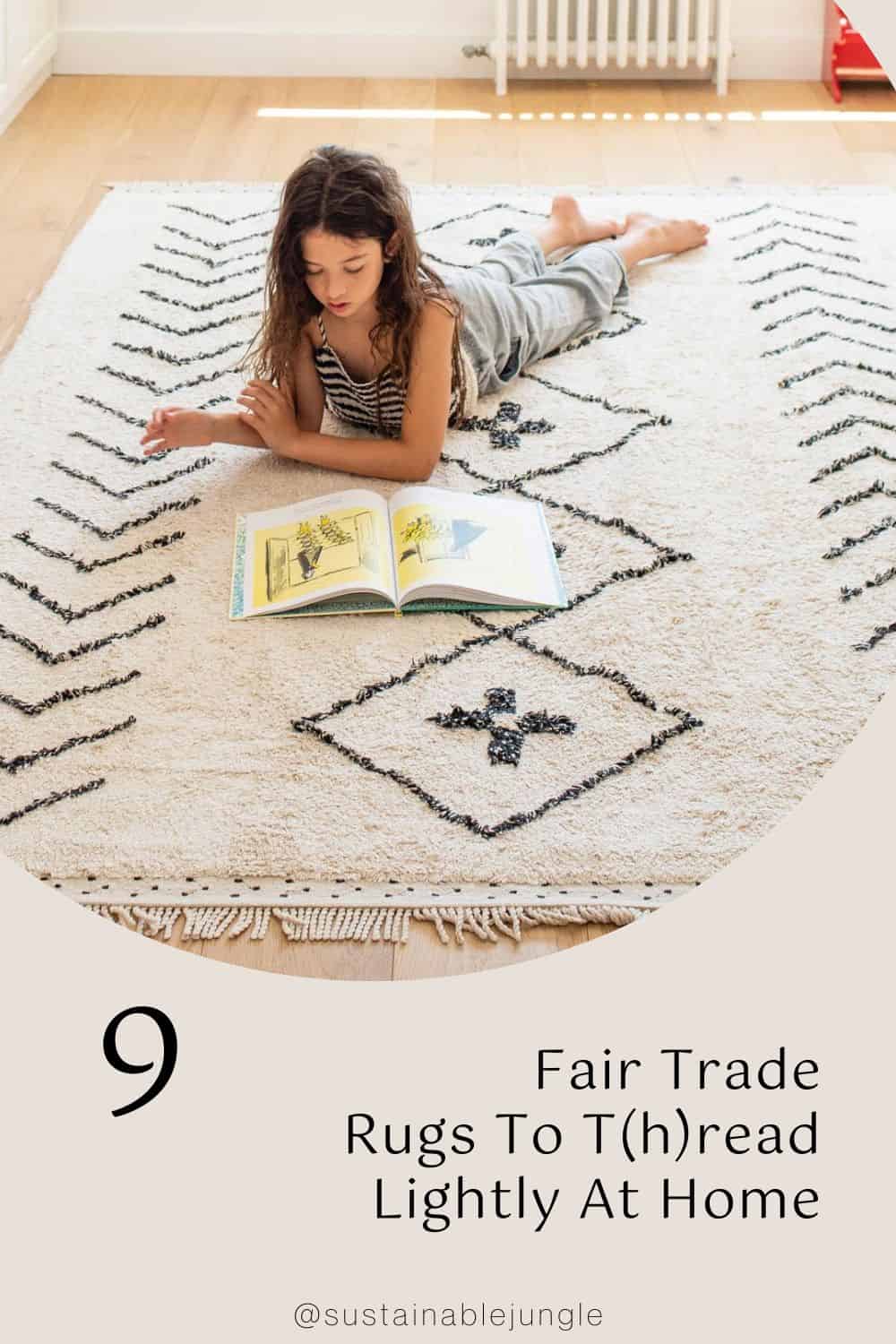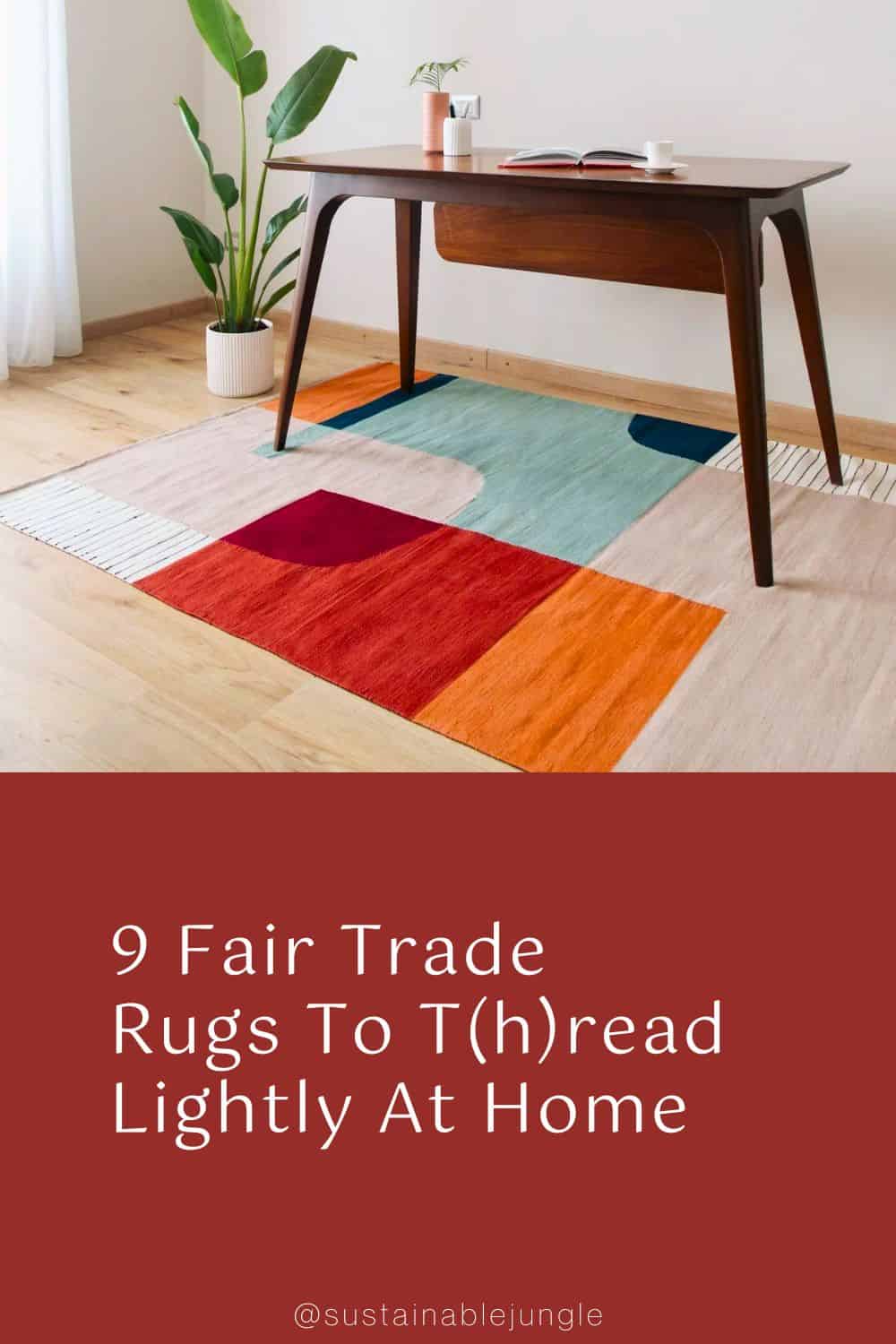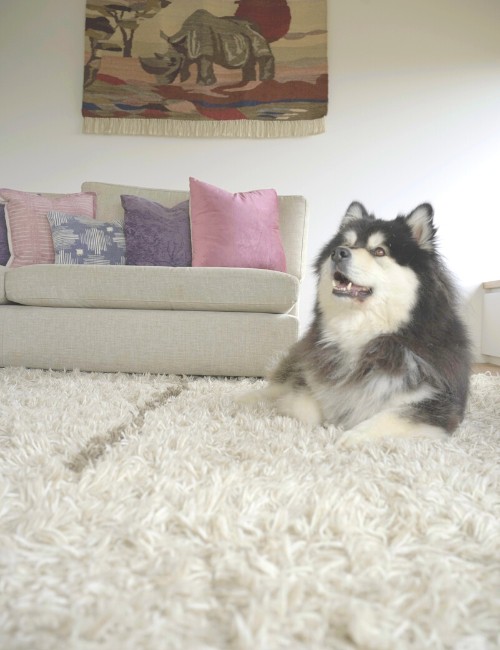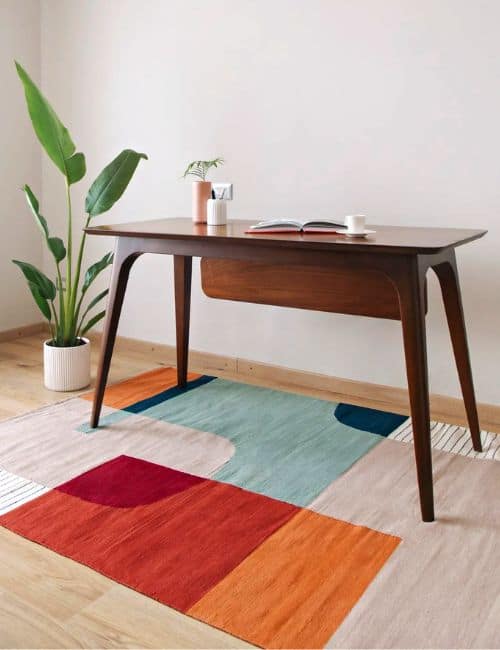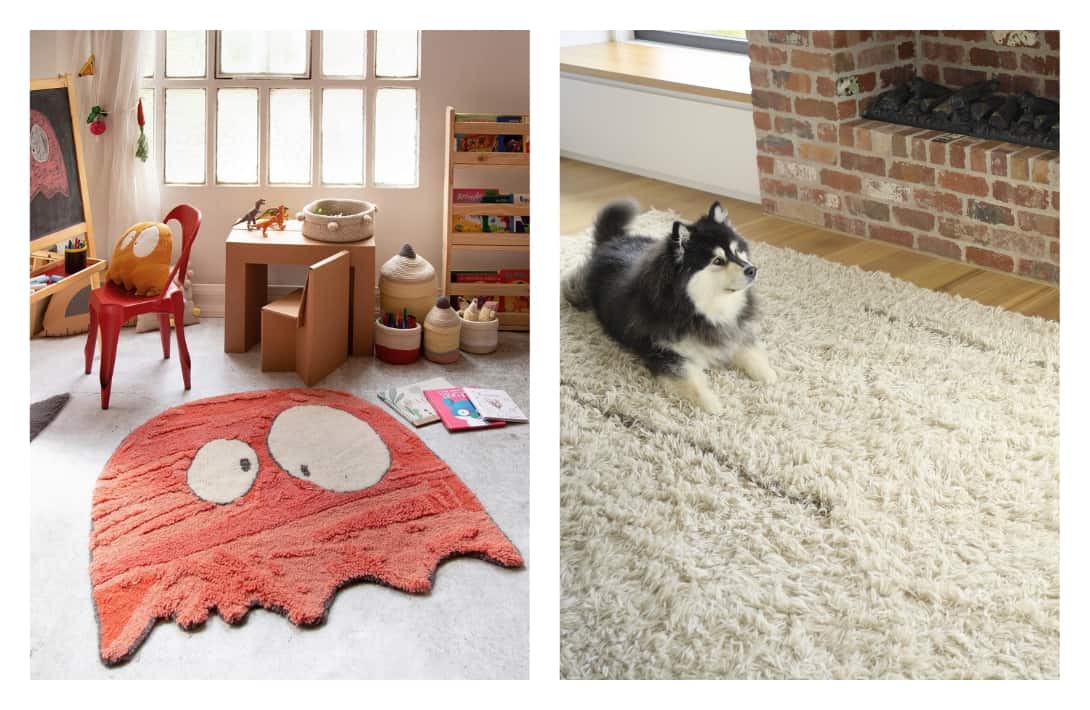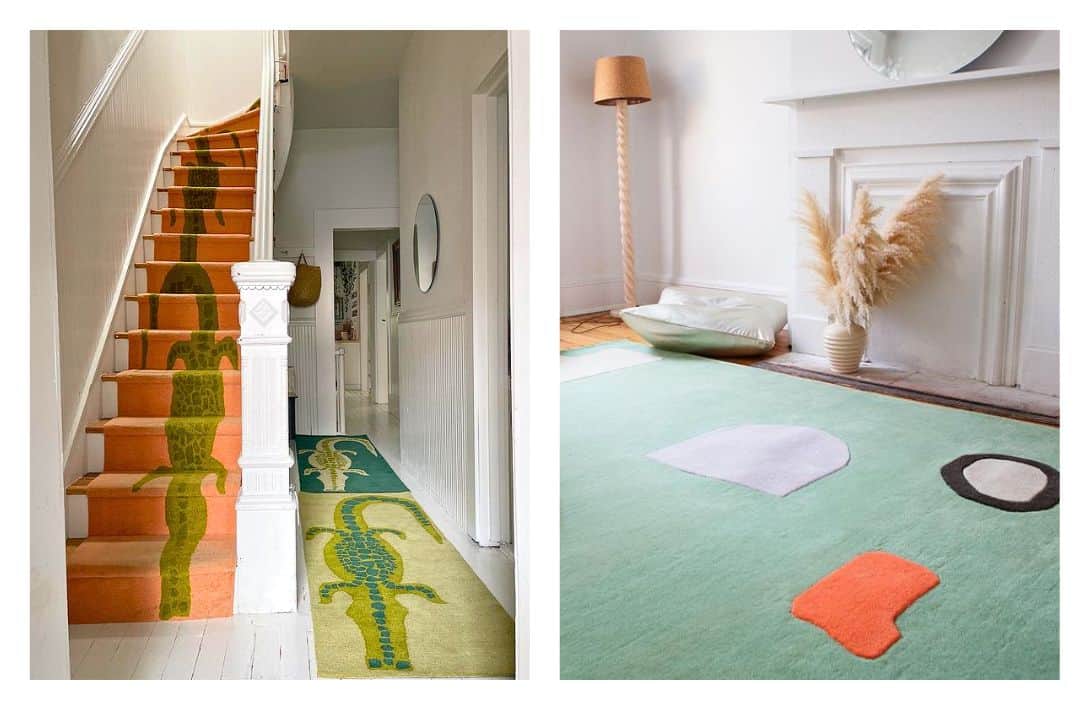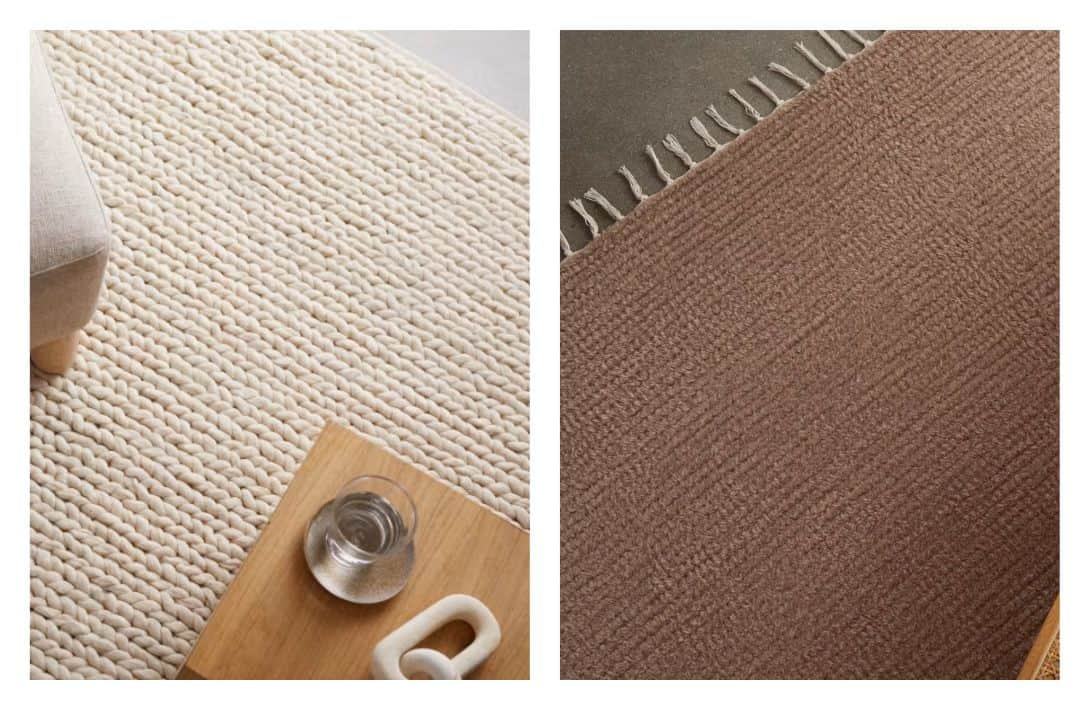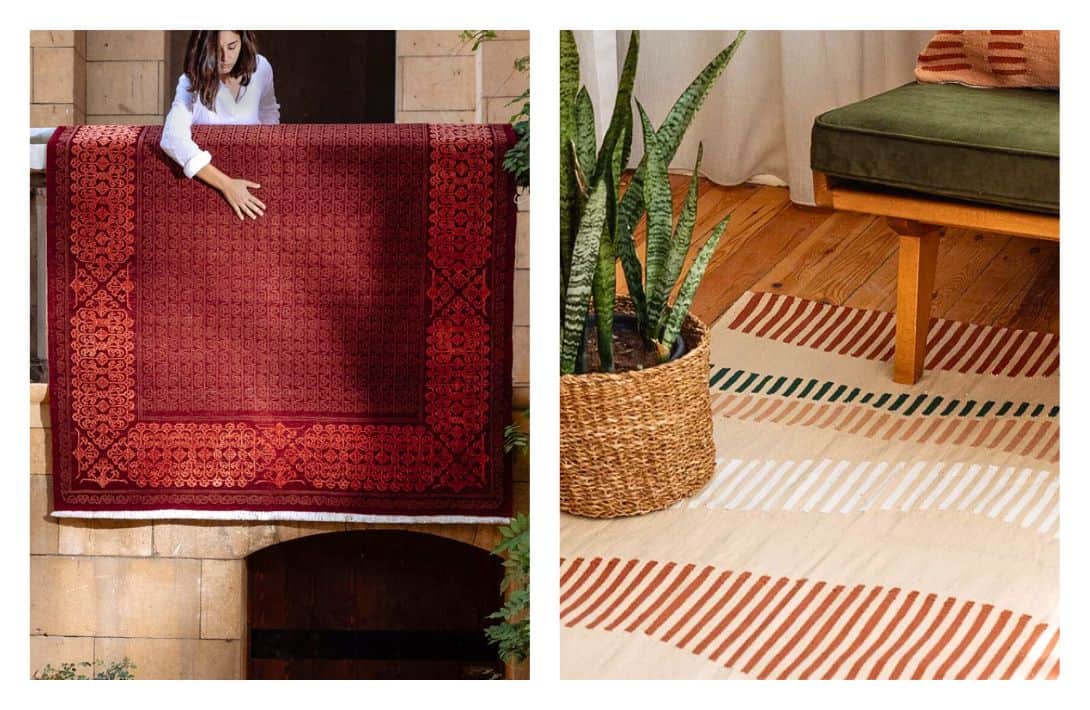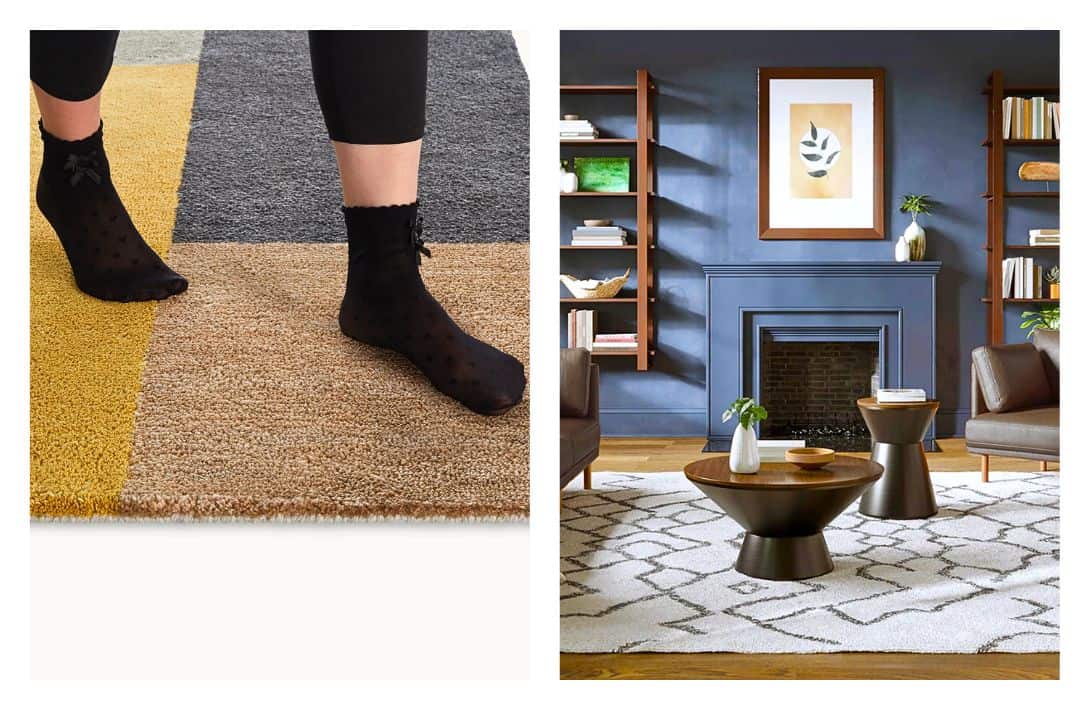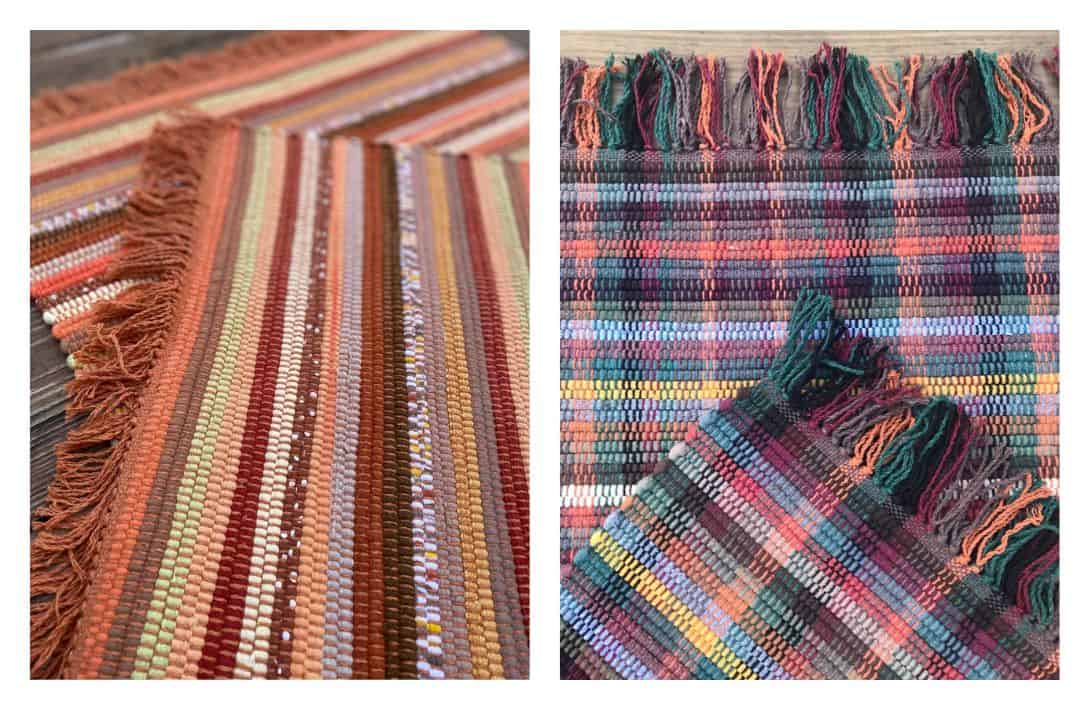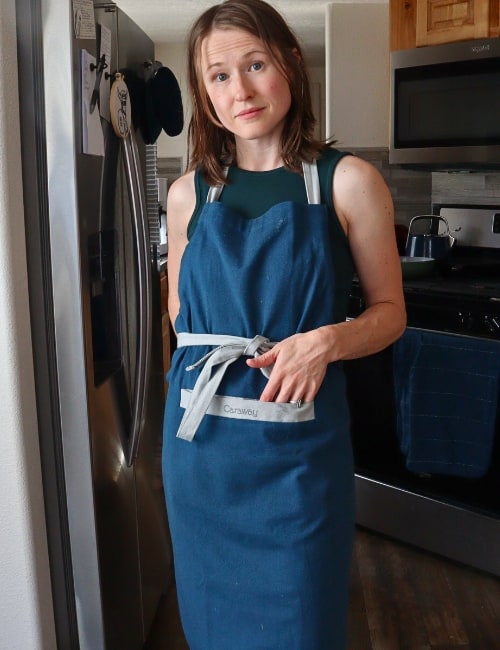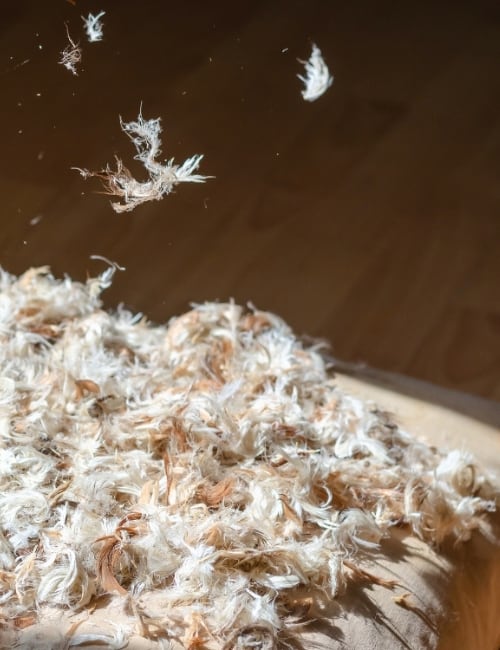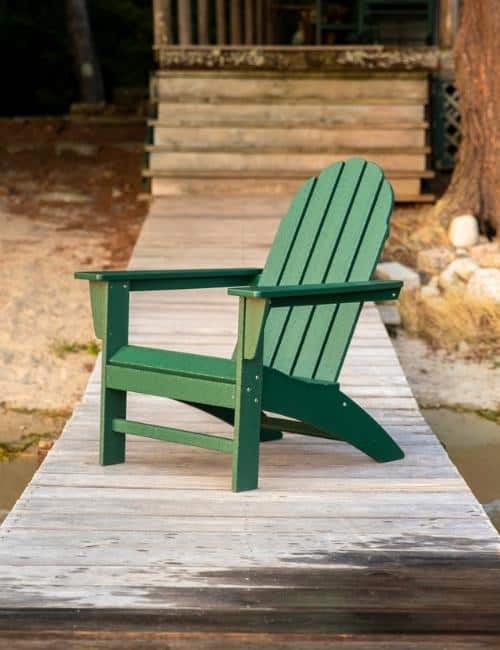9 Fair Trade Rugs To T(h)read Lightly At Home
Step onto the vibrant tapestry of ethical indulgence as we roll out the ethical red carpet with a sustainably stunning collection of certified fair trade rugs.
These ethical rug shops are pulling out from underneath those traditional scratchy plastic floor coverings that support an industry rife with child labor.
Get ready to unroll the fun and discover why these hand-braided fair trade rugs are more than mere floor coverings—they’re woven stories of style with a conscience.
Everything we recommend to you on Sustainable Jungle is independently researched and we ask all brands to confirm their claims. To avoid waste, we test products on an as needed basis. This post contains affiliate links. If you buy something through our links, we may earn a small commission. Learn more about why we do this here.
Fair Trade Rug Brands That Make Our Ethical Red Carpet
Salam Hello brings you handmade artisan rugs from deep in the Atlas mountains.
Each one is truly unique, made by members of a Berber women’s weaving association called Association Anezal, and can take from two to 17 months to complete.
Lorena Canals is working towards zero-waste production with their new range of Rugcycled rugs. But the first-ever washable Fair Trade wool area rugs they’re making is our dog’s clear favorite.
Saving your home from toxic synthetics, not only are Parachute’s rug fair trade, but they’re made of natural materials. They also offer a non-slip pad made using 100% recycled fabrics and natural latex backing.
We’ve rolled out our process for picking ethically made rugs towards the bottom of the page.
The Full List For Where To Buy Ethical Rugs
- Lorena Canals | Visit Store
- Cold Picnic | Visit Store
- Parachute | Visit Store
- Salam Hello | Visit Store
- Made Trade | Visit Store
- The Citizenry | Visit Store
- Burrow | Visit Store
- Loomy | Visit Store
- El Ocotal Weavers | Visit Store
1. Lorena Canals
About Lorena Canals
Price Range: $40–$995
Lorena Canals is a woman-owned business that can help you furnish your home with fair trade recycled rugs of all manner of shapes, sizes, and colors.
Choose from round, rectangular, silhouette, runner, square, wool, cotton, and let’s not forget the Rugcycled rugs.
Their collection of zero waste sustainable rugs give a second life to the cotton leftovers from their productions.
Our personal favorite (and clearly our dog’s) is the Woolable Rug Autumn Breeze. The minimalist color palette goes with most color schemes so it’s a safe bet which for us was a necessity because we have an eclectic mix of decor. The soft wool is problematic in that you’ll have a very hard time getting off the floor!
It’s also clear that the stitching and craftsmanship is a cut above other conventional rug manufactures. We expect this to last a very long time.
Lorena Canals’ Ethical & Sustainability Practices
Materials:
The materials used include recycled cotton, pure cotton, and ethical wool, but the most sustainable material is the upcycled production scraps used to create their RugCycled ® line.
Non-polluting dyes are used for their cotton rugs, certified by international standards like GOTS and OEKO-TEX. The Woolable range of rugs is naturally colored, depending on the coat of the sheep.
Supply chain & labor practices:
The production process for all Lorena products follows fair trade practices.
Most of the production workforce are women artisans based in India who work in ISO 9001, 14001, and 18001-certified conditions.
Carbon commitments & green practices:
As well as being made from natural fibers, all rugs are delivered to the customer in shipping bags made of plastic that is 100% recycled and 100% recyclable.
Upcycling their scraps means they can reduce their impact on natural sources. Water used in the dyeing and washing process is recycled and up to 75% of the water is recovered and reused.
A further reduction in water consumption is made by using a more efficient “cone-dyeing” method, saving around 75% of water compared to “piece-dyeing”.
Community & charitable giving:
All pieces fulfill a social mission through the Sakûla Project, focused on educating the children of the factory’s craftswomen.
The project helps build nurseries for underprivileged children which provide safe spaces, free meals, and education, as well as donating funds to an Indian public school.
2. Cold Picnic
About Cold Picnic
Price Range: $150–$1,950
Bring a splash of color into your home with one of Cold Picnic’s brightly colored and fun patterned rugs which are hand-tufted or woven.
Their range of fair trade Indian rugs is made using a variety of materials including wool, organic cotton, hemp, and bamboo silk.
For your animal-loving kids, the Crocodile rug is one of their all-time bestsellers.
Cold Picnic’s Ethical & Sustainability Practices
Materials:
Cold Picnic uses a range of environmentally friendly materials, including 100% New Zealand wool with OEKO-TEX certification, bamboo silk, or 100% hemp.
As part of their commitment to reducing waste in manufacturing, they have also started using leftover yarn for their Deadstock rug collection. Products are added to the collection intermittently, as leftover yarn becomes available at their factory.
All yarns are dyed in small batches using sustainable dyes and the finishing process doesn’t use toxic chemicals or flame retardants.
Supply chain & labor practices:
The production process takes place in a GoodWeave and Care & Fair (C&F)-certified factory in India. Certification demands complete supply chain transparency and a commitment to children’s rights, worker’s rights, and strengthened worker communities.
There is also a small family-run factory in India with 20 employees that manufactures the range of bathmats. The factory is SA8000, GRS, and GOTS-certified.
Carbon commitments & green practices:
The factory is 100% dependent on solar energy, and all hand-tufted weaving machines also use solar energy to run.
Plastic wrapping and tubing used for protection during transportation are reused, while the bath mats are packaged in locally sourced compostable bags. The plan is for this packaging to be rolled out for the entire product range.
Community & charitable giving:
Cold Picnics factory has established and continues to fund a school that currently has over 140 students. It has also helped several other community initiatives and support organizations such as WIRES NSW Wildlife Rescue and City Meals on Wheels.
3. Parachute
About Parachute
Price Range: $89–$1,899
Parachute wants you to enjoy a Happy Home and Happy Planet by selling a range of feel-good things you can feel good about.
Bring new life into the heart of your home with Fair Trade kitchen rugs or keep your feet warm when you roll out of bed in the morning with one of their fair trade wool rugs like the Rib Wool Bedroom Rug.
If you love soft neutrals and earthy tones like we do, Parachute’s entire range of sustainable home decor can help you cover a lot more than just your floor.
Parachute’s Ethical & Sustainability Practices
Materials:
Only natural materials are used to produce Parachute’s range of handwoven rugs in a blend of 75% non-mulesed New Zealand wool and 25% OEKO-TEX cotton.
For high-traffic and outdoor areas, they also offer fair trade jute rugs.
You can also enjoy a more non-slip rug experience by purchasing Parachite’s rug pads, made using 100% recycled synthetic fibers and latex backing.
Supply chain & labor practices:
Parachute’s certified fair trade wool rugs are made in a factory that meets rigorous social, environmental, and economic standards
Many items are also Craftmark certified as handmade by traditional artisans.
Carbon commitments & green practices:
Parachute is a Climate Neutral Certified company, compensating for its footprint with verified carbon credits.
In 2022, the company launched its first circular program—the recycled down pillow, made of sanitized down from returned Parachute sustainable pillows.
Community & charitable giving:
Committed to taking action towards anti-racism, Parachute established a Home for Dreams initiative in the fall of 2020. It is a mentorship and grant program supporting Black-owned, product-centric businesses with capital, advisory meetings, and brand amplification.
4. Salam Hello
About Salam Hello
Price Range: $275–$1,842
Founded by Mallory Solomon, Salam (Arabic for “peace”) Hello connects directly with Moroccan women to bring their one-of-a-kind rugs to market with full price transparency and fair wages.
Salam Hello is a sustainable textile company that brings Fair Trade Moroccan rugs from the Atlas Mountains directly to the United States.
Every rug is different, designed entirely from the artisan’s imagination. The symbols on Naima’s Family-Made Hanbel depict protection from evil, strength, beauty, and respect, to name just a few. The rug itself was woven by Naima’s sisters-in-law, aunts, and cousins—truly a family affair.
Let’s not forget Salam Hello’s range of handmade Boucherouite Moroccan rugs, crafted from a mix of yarn, recycled clothing, and textile scraps.
Salam Hello’s Ethical & Sustainability Practices
Materials:
These hand braided fair trade rugs are made with sheep, goat, or camel wool. The artisans use “live wool”, which means it’s taken from live animals, without harm.
The wool is then washed, carded, brushed, and spun into yarn, also done entirely by hand.
The wool is then dyed, using local, naturally sourced spice, plant, and herb blends. For example, olive leaves turn the wool a light green color while henna leaves create an earthy red.
Supply chain & labor practices:
Salam Hello meets every artisan face-to-face.
They ask the women to share the stories behind their textiles and involve them in negotiations to ensure they’re fairly compensated for their time and labor, never offering below an artisan’s asking price.
Carbon commitments & green practices:
Each rug is crafted from start to finish by a single artisan using a wooden loom and hammer comb.
Completed rugs are cut off the looms on days corresponding to the cycle of the moon, then washed, dried, and brushed by hand.
Community & charitable giving:
Solomon hopes to help Berber women expand their business and puts 10% of profits back into their communities and provide them with tools to support their rug-making.
5. Made Trade
About Made Trade
Price Range: $69–$1,350
Made Trade is a woman-owned sustainable store specializing in sustainable, beautiful, and unique items from a variety of vetted partner brands.
That means you’re getting sustainably and ethically made rugs from the world’s best fair trade and heritage brands.
Take the Obelisk Runner from Kiliim, for example, handcrafted by artisans in Fowwa, Egypt.
We love the geometric patterns from Kiliim, but across all available brands, you’ll find a nhuge selection of colors, designs, sizes, and shapes, to suit any room or area, from fair trade small rugs to full-size area rugs made in the USA.
To complement your rugs, Made Trade offers everything home-related, from sustainable furniture to tablewares.
Made Trade’s Ethical & Sustainability Practices
Materials:
A diverse selection of materials are used for making the rugs. They include wool, organic/traditional cotton, sisal/sweetgrass, and jute.
We should point out that not every rug is equal in terms of sustainability, so read the product description carefully.
Supply chain & labor practices:
Made Trade is very transparent when it comes to product information and you’ll find details of where each product is made and by whom.
Many are made using traditional techniques, associated with Fair Trade or Direct Trade programs, or certified by Good Weave.
Carbon commitments & green practices:
Made Trade is Climate Neutral certified, which means all orders, including shipping and returns, are 100% carbon offset.
All carbon emissions from the production and transportation of any product are 100% offset through the purchasing of carbon credits through their partnership with Climate Neutral.
6. The Citizenry
About The Citizenry
Price Range: $399–$4,589
The Citizenry offers a wide selection of handwoven rugs including area rugs, runners, and accent rugs.
There are also hand-knotted rugs, such as the Lalita hand-knotted area rug made using the finest New Zealand wool in a Fair Trade workshop in Bhadohi, India.
Multiple sizes are available for all the different rugs and there are various colors to choose from.
To keep your purchase in tip-top shape and perfectly in place, The Citizenry also sells rug pads made from eco-friendly felt and natural rubber.
The Citizenry’s Ethical & Sustainable Practices
Materials:
Various materials are used to make The Citizenry’s rugs, including wool, cotton, and natural jute.
The wool is ethically sourced, protecting the welfare of animals at every step of the process.
Supply chain & labor practices:
The Citizenry is the first home retailer to have 100% of products (like sustainable cushions and eco-friendly shower curtains) made with a Fair Trade process, audited and guaranteed by the World Fair Trade Organization.
On average, workers are paid 2x the fair trade wage requirement.
Carbon commitments & green practices:
To help consumers save money and to prevent returned items from ending up in landfill, there is a program called Second Home. The platform gives resale and good-as-new returns a second home, all up to 35% off.
Community & charitable giving:
The Citizenry believes in supporting their artisan communities and reinvests 10% of profits to help their artisan partners take their crafts and businesses to new places.
7. Burrow
About Burrow
Price Range: $185–$899
The founders of Burrow wanted to take a new approach to furniture because they were frustrated with having to make compromises between quality, affordability, and convenience.
Initially, this non-toxic furniture brand’s focus was on modular designs made using premium, durable materials that would last for years.
This brand has also added ethical area rugs to its inventory. They come in a range of earthy colors and sizes and all of them, including the Prairie Modern Rug are made from 100% recycled polyester, with a hand-tufted texture that balances feel with vacuum-friendly properties.
Burrow’s Ethical & Sustainability Practices
Materials:
All of Burrow’s performance rugs are made using 100% recycled polyester fibers. Burrow’s furniture uses sustainably sourced hardwood and non-toxic fabrics.
Supply chain & labor practices:
For their quality fair trade rugs, USA brand Burrow partners only with ethical entities.
While their eco-friendly coffee tables and other furniture pieces are actually made in the USA, they also partner with a heritage rug maker in India to craft rugs by hand.
With such a partnership, the company is contributing to a sustainable, ethical economy in rural areas, providing quality jobs with high standards for working conditions.
Carbon commitments & green practices:
The modular design of Burrow furniture means items can be packed into manageable boxes and shipped just like a normal package.
Recyclable packaging materials also help to keep their footprint low.
8. Loomy
About Loomy
Price Range: $348–$10,500
If you’re looking for “the right way to rug”, Loomy provides the solution by enabling you to buy ethical rugs directly from the artisan creators.
Choose from a selection of Fair Trade outdoor rugs, and luxury vintage rugs (such as the one-of-a-kind Auburn Vintage rug), or customize your perfect Loomy area rug, accent rug, or runner.
Loomy’s Ethical & Sustainability Practices
Materials:
Loomy offers a range of fibers in their rugs. They use natural fibers such as wool, jute, cotton, and hemp.
Select rugs are made from a blend of wool and viscose fabric, which we suggest avoiding if you can since viscose isn’t the most sustainable semi-synthetic fabric.
Loomy’s collection of outdoor rugs is made from PET, a man-made fiber made from sustainable yarn spun from recycled plastics, helping to keep plastic bottles and other waste from our oceans.
Supply chain & labor practices:
This non-toxic rug brand works with family-owned, small manufacturers in India, Turkey, Portugal, Nepal, and Morocco and ensures products are produced with fair labor and fair market conditions.
Carbon commitments & green practices:
5 billion pounds of rugs go to waste each year—amounting to 2% of the total US landfill mass.
Loomy instead offers heirloom quality products made using a small batch, handmade process to provide rugs you can pass on.
9. EI Ocotal Weavers
About EI Ocotal Weavers
Price Range: $71.94–$131.94
El Ocotal Weavers is a collective of women who live and work in the small village in the mountains above Matagalpa, Nicaragua, one of the poorest regions in the Western Hemisphere.
The collective was started by a mother-and-daughter team Ivy and Carol Blackmore. There was no weaving tradition in the village but Carol brought a loom for the United States and they started teaching basic weaving skills.
More looms were added and the weavers and their families built their workshop with the help of a grant.
When it comes to buying ethical rugs online, the El Ocotal Weavers deliver value for money throw rugs in striking colors including coral, amber, cream, and sage, runner rugs, and area rugs made using cotton warp and recycled fabric. Placemats and table runners are also part of the selection.
EI Ocotal Weavers Ethical & Sustainability Practices
Materials:
The weavers use a cotton warp and recycled cloth usually sourced from used clothing stores in the city of Matagalpa.
Because they use recycled cloth, their products include a range of natural and recycled synthetic fabrics.
Supply chain & labor practices:
With a more stable source of income from product sales, families in the collective have less financial stress and greater equality.
Prices for products are determined through close consultation with the weavers to ensure they are receiving a fair price for their products.
Carbon commitments & green practices:
The collective is working towards implementing sustainable land management practices on several acres of land they recently purchased.
Products are shipped in cardboard packaging to reduce plastic waste and one of their US offices is powered primarily by solar power.
Etsy offsets carbon emissions from shipping and packaging on purchases made from their Etsy store.
Community & charitable giving:
One of the most significant uses of money made from weaving has been paying for education.
They organize regular trash clean-ups in surrounding communities and provide free reading glasses free to those in need.
Did you know we Have a Newsletter?
We cover the latest in sustainable living, fashion, zero waste, beauty, travel, finance and more…
How We Chose These Fair Trade Area Rugs
Sure, eco-friendly sofas and fair trade rugs are all a part of decorating your home.
But they’re also about a lot more than that, especially when we consider the lives of each and every hand that goes into making the products we buy.
We prefer to be transparent in everything we share, so there’s no way we’ll sweep anything under the rug when it comes to finding the best ethical rugs.
To help you understand completely how we picked the sustainable brands featured above, we used an adaptation of our sustainable fashion criteria to judge brands based on the following:
Materials:
Ultimately, we’re looking for manufacturers that are making rigs without plastic.
Natural fibers include recycled/organic cotton, hemp, wool, and similar fibers, all of which are compostable and sustainable.
For fair trade outdoor rugs, something more durable is called for and in this case, we’re looking for natural or recycled materials such as recycled synthetics or jute.
- Certifications: Global Organic Textile Standard (GOTS), Global Recycle Standard (GRS), OEKO TEX
Supply chain & labor practices:
Fair Trade rug brands shouldn’t be embarrassed about lifting the rug on their supply chain and being completely transparent.
To avoid any greenwashing concerns, we look for transparent information about where products come from, who made them, and how they’ve been treated.
Third-party certification acts as confirmation of certain standards, but make yourself aware of things like B Corp greenwashing so you’re fully informed.
- Certifications: Fair Trade, GoodWeave, Care & Fair (C&F), ISO 9001, ISO 14001, ISO 18001, Social Accountability International (SA8000)
Carbon commitments & green practices::
A good starting point is rugs that are designed with durability to ensure a long and healthy life. Further confirmation of green practices includes water-saving manufacturing processes, carbon offset programs, and sustainable packaging materials.
Community and charitable giving:
We prefer to be jumping out of bed and keeping our feet warm with ethically made rugs that are making a positive impact in the community and companies are using profits to make the world a better place.
Final Thoughts On The Best Fair Trade Area Rugs
Shopping for new rugs is really fun, but that doesn’t mean we should overlook the charm of second hand options.
Second hand stores are a treasure trove of unique rugs with a history. Embracing thrift shopping not only reduces environmental impact but also adds character to your space.
But if you’re wondering how to buy ethical rugs online, it’s easy! These brands are experts at packing and shipping their rugs worldwide, and you can buy knowing you’re supporting a better, less exploitative side of the rug industry.
Know some friends in the middle of a major renovation? Or maybe some who just moved into a new apartment with AWFUL linoleum flooring?
Share this post with both of them so together, we can weave a tapestry of positive change in our homes and beyond.
Pin these:
